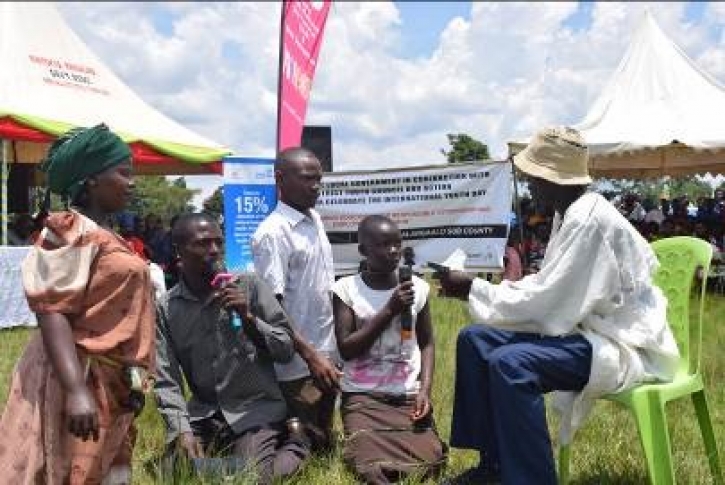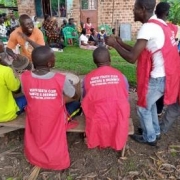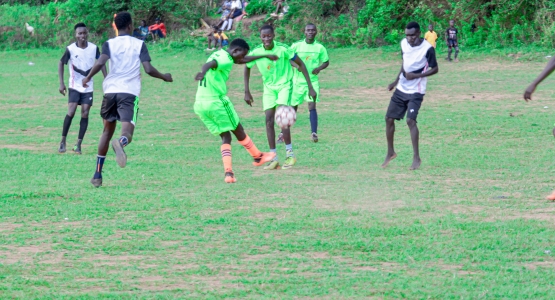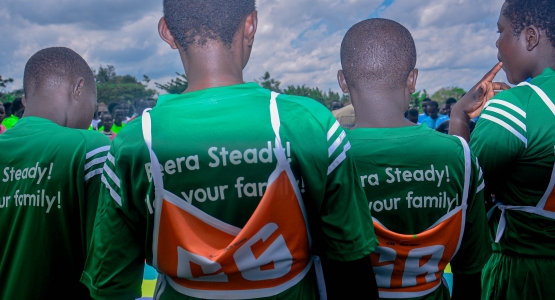Delivering Sexual and Reproductive Health Information to Young People through Theatre

Drawn by the sound of traditional drumming, a crowd has gathered on a sunny afternoon in Mityana District, Uganda, to watch young performers dance and sing energetically. The dancing then gives way to a skit in which a charming married male character courts a girlfriend. As the skit progresses, the audience laughs often. By the time the scheme congeals to its educational peak, the crowd members are fully enjoying themselves—and clued-up to absorb the information on sexual and reproductive health intentionally entwined into the scheme.
When the lead character discovers he is sickly, he seeks medical attention from a Health Facility, gets tested and is found to be HIV positive. He cunningly returns home but the wife notices his ailing health state. A fight erupts at home and the local leaders and a kind policeman intercedes and advises the couple to visit the local health clinic’s youth-friendly corner for counselling and support options.
This theatre for community action is a proven effective educational method for sharing essential and sometimes life-saving information on sexual and reproductive health. Action 4 Health Uganda under TeamUp Program supports community youth clubs in using Theatre 4 development (T4D) to teach people where they can access services like HIV testing and counselling and contraception. The performances also create community conversations and shift attitudes related to the stigma surrounding youth sexuality. It combines entertainment, education and referral to critical services focusing on HIV prevention and prevention of unplanned pregnancy and adoption of healthier behaviours.
Performances use dancing, singing, poetry and comedy to inform young people they can obtain confidential reproductive health services by visiting Health Facilities and “youth-friendly corners.”
Performances like this is effective because it strategically intertwines reproductive health information on stigmatized, mythical or taboo topics into high-energy, engaging arts that appeal to young people.
“This is a new way of doing things, otherwise if you just walked into a community and you started telling them about youth sexuality, you won’t be received. But with theatricals, communities are very receptive to information. Sometimes, the crowd doesn’t notice that you have started providing reproductive health information” narrates Batema Edmond, a Sexual and Reproductive Health Officer, A4HU.
To account for cultural taboos and stigma surrounding sexuality, performances often start with less controversial reproductive health topics and then move to addressing those that are considered sensitive. Performances allow for interaction with the audiences in a way that enhances participation, responsiveness and feedback. Same approach has been adopted for in-school interventions for promotion of sexual and reproductive health and menstrual hygiene.

“By bringing the dissemination of information directly to young people, T4D is able to: eliminate the barriers of time and distance by making information (and sometimes services) available in places where young people typically spend their time; educate and inform young people about health products and services thereby increasing their knowledge and/or skills; encourage dialogue on health issues, dispel beliefs and misinformation regarding health products and services; challenge gender attitudes and norms that may inhibit the use of health products and services and generate demand for health products and services,” Alex Ssenyondo, Project Manager, A4HU.
It’s a practice that after the performances, Peer Educators and Youth Champions announce their availability to the young people- to answer any raising questions about sexual and reproductive health. Some young people approach them in public, while others seek them out during their peer learning and health education sessions.



